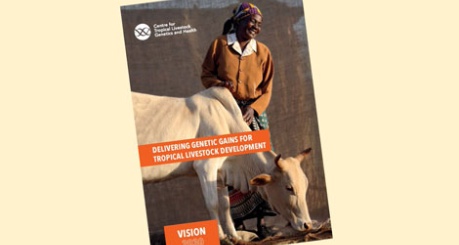Wednesday 22nd July 2020, 5:00pm
The key strategic objectives and future focus of the Centre for Tropical Livestock Genetics and Health (CTLGH) for the next 10 years have been published in the Centre’s ‘Vision 2030’ document.

The Vision 2030 document also clearly outlines how the CTLGH intends to measure its success against each of these three objectives and how its work continues to deliver the global agenda of the United Nations Sustainable Development Goals and to contribute towards resilient, productive and sustainable food systems..
Building on the achievements it has made in its first five years, the CTLGH will focus on three strategic objectives:
A strategic livestock genetics research and development alliance between the University of Edinburgh (through the Roslin Institute), Scotland’s Rural College (SRUC) and the International Livestock Research Centre (ILRI), CTLGH has made significant progress since it was established in 2014.
“We have leveraged our strength and focus on tropical livestock genetic improvement to set ambitious, bold and relevant goals for the next 10 years. We therefore look to the 2030 horizon with optimism, building on previous CTLGH achievements. We remain indebted to the Centre’s researchers, collaborators and advisors as well as our generous funders who are committed to establishing resilient, productive, efficient and environmentally sustainable tropical livestock systems.”
The Centre’s researchers have already developed important tools to
support genetic improvement in tropical livestock and enhanced
scientific capacity of researchers in sub-Saharan Africa through
training and research placements. Examples of some of these achievements
can be found in the ‘Five Year Highlights’ published by the Centre in
2019. Emphasis has been placed on the importance of collaboration and
partnership working so that CTLGH can develop relevant solutions to
improve tropical livestock production systems.
"Strategically, CTLGH research is positioned for discovery. However by establishing strong collaborations with industry and farmer facing programmes and institutions, the research generated by CTLGH can be translated, adopted and applied in the field for the benefit of livestock producers.”
Dr Jimmy Smith, Principal of CTLGH and Director General of ILRI“CTLGH is uniquely positioned to develop and combine tools and resources in genetics, genomics, animal breeding, reproductive technologies and data science to drive genetic gains in support of tropical livestock development in low- and middle-income countries.”
Professor Bruce Whitelaw, Principal of CTLGH and interim Director of the Roslin Institute“CTLGH has made significant progress since it was established in 2014. We are determined to ensure that the Centre will continue to leverage innovations which our respective institutions and partners have developed, to help strengthen livestock development globally.”
Professor Wayne Powell, Principal of CTLGH and Principal and Chief Executive of SRUCWith research nodes in Scotland, Kenya and Ethiopia, the Centre receives funding from the Bill & Melinda Gates Foundation, the UK Department for International Development (DFID), the UK Biotechnology and Biological Sciences Research Council (BBSRC) and Jersey Overseas Aid (JOA).
Source: CTLGH